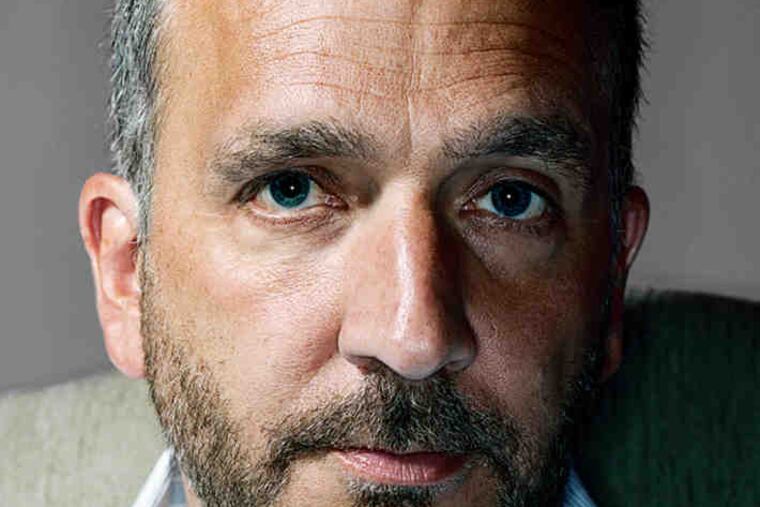Pelecanos has returned to form with a new, ex-Marine gumshoe
George Pelecanos is rejuvenated in The Cut, the literary crime writer's 17th novel and the first to feature Spero Lucas, a 29-year-old ex-Marine Iraq war veteran turned tough-guy investigator.

By George Pelecanos
Reagan Arthur Books. 304 pp. $25.99
nolead ends nolead begins
Reviewed by Dan DeLuca
George Pelecanos is rejuvenated in
The Cut
, the literary crime writer's 17th novel and the first to feature Spero Lucas, a 29-year-old ex-Marine Iraq war veteran turned tough-guy investigator.
Over the course of his last four novels, Pelecanos - who has also worked on the HBO series The Wire and The Pacific, and currently writes for David Simon's New Orleans drama Treme - has been somewhat adrift, trying out new modes of storytelling with results that have been sometimes superb (2008's The Turnaround) and sometimes disappointing (2009's The Way Home).
With The Cut, Pelecanos returns to the urban western form that is his forte, and does it while introducing Lucas, a meticulous, hard-driving gumshoe who motors around Washington, D.C., and its suburbs in a Jeep Cherokee or pedals a mountain bike and takes surveillance photos with his iPhone.
A white guy who's the adopted son of Greek American parents and has an African American schoolteacher brother who is also adopted, Lucas is either - as his law student girlfriend puts it - "the most complicated guy I ever met, or the simplest."
With his mind seared by memories of Fallujah fire fights, Lucas is an honorable man nonetheless willing to wade into gray ethical areas if that's what he needs to do to do his job, and do it well.
That job usually entails recovering clients' stolen property - and taking a hefty 40 percent cut of whatever he brings back, whether it's pilfered jewelry, or, in this instance, a 30-pound FedEx package of marijuana intercepted from a stoop in a gentrifying Washington neighborhood.
So there's plenty of nebulous moral ground for Lucas to navigate, and nefarious characters to bump up against, starting with the behind-bars crime boss who wants his weed back and professes to be a (business) man of peace.
As with all of Pelecanos' fiction, The Cut is set in "the other D.C.," the parts of the district where working-class blacks, Latinos, and whites go about their daily honest or evil business, out of the purview of the suits who work on Capitol Hill and go home to the bedroom communities of Bethesda and Chevy Chase.
When Pelecanos is at his best - as he is here - the action hurtles along, marked by "good, clean writing," to borrow Lucas' description of books by favorite authors Willy Vlautin and Daniel Woodrell, while sharply delineated characters are thrust into life-threatening situations.
Back in the 1990s, when Pelecanos was forging his style in novels featuring alter ego Nick Stefanos, the author was dubbed "the Zola of Washington." That was in reference to the painstaking attention to detail establishing a mise en scene in the blue-collar quadrants of the district that Pelecanos holds dear. In The Cut, the perspicacious social observer has plenty to write about, as the streets of his beloved D.C. are transformed by gentrifying young professionals.
Earlier this year, Washington ceased to be a majority black city for the first time in 51 years. The Cut is set in the summer of 2010, as foolhardy Redskins fans look forward to a season with a quarterback named McNabb at the helm. All the societal changes afoot give the author fresh context to explore racial issues that he depicts with empathy and intelligence.
So while Lucas, sometimes with the help of a brotherhood of ex-Marines, works to get to the bottom of nasty, depraved criminal doings, his creator has plenty of grist to work with. As always, he uses music to delineate character, and here, resists the temptation to overdo it. Lucas is a dub-reggae man, but also appreciates his late father's love for the Rolling Stones, Marvin Gaye, and old-school funk.
Pelecanos details the reasons for the falling violent crime rate in the district, while continuing to make the righteous argument that by burying the news of the deaths of young blacks inside the newspaper, the Washington Post tells its readership "implicitly that black life was worth less than that of whites."
There is some mystery involved, but like all of Pelecanos' novels, The Cut isn't so much a whodunit as a where-, what-, why- and howdunit. There's plenty of heft, but the book crackles with energy as it follows its sometimes hotheaded protagonist, who's trying to make peace with the world while still feeling the pull of the charged atmosphere he became accustomed to while spending his youth in the theater of war.
The Cut is hard to put down, and it sticks with you when you do.